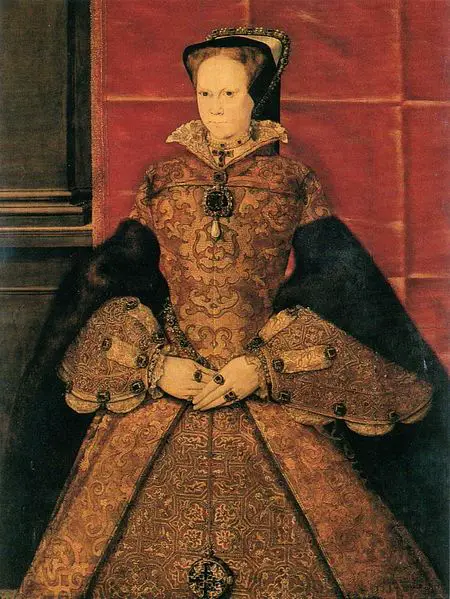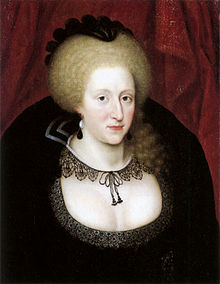27 August
1549 - The Battle of Dussindale took place, ending Kett's Rebellion in Norfolk. Click here to read more.
1557 – The storming of St Quentin by English and Imperial forces. Admiral de Coligny and his French troops, numbering only a thousand, were overcome by around 60,000 soldiers, and St Quentin fell. Henry Dudley, the youngest son of the late John Dudley, Duke of Northumberland, was killed by a cannonball during the storming.
1590 – Death of Pope Sixtus V at Rome.
1610 – Funeral of Lady Anne Bacon (née Cooke), mother of Sir Francis Bacon, at St Michael's Church, near St Albans. Anne was the daughter of Sir Anthony Cooke, and was known for her translation of John Jewel's “Apologie of the Church of England”.
28 August
1550 – Death of Thomas Magnus, administrator, Archdeacon of the East Riding of Yorkshire, member of the King's Council and diplomat, at Sessay in the North Riding of Yorkshire. He was also buried there.
1551 - Lord Chancellor Richard Rich, Sir Anthony Wingfield and Sir William Petre went to Copthall in Essex to see Edward VI's half-sister Mary. The purpose of their visit was to deliver the King's order that Mary and her household should desist from celebrating the Catholic mass, and that Wingfield should replace Robert Rochester, whom Edward's council had removed, as Mary's comptroller. Mary refused to obey them and they were forced to leave, having failed their mission. Click here to read more.
1553 – Death of Sir John Harington, administrator, in Bishopsgate, London. He was buried in Exton. Harington served Henry VIII as Esquire of the Body, Treasurer of War (1542 and 1543), Vice-Treasurer of the army for the 1544 French campaign and Treasurer of the expedition to France (1546).
1583 – Burial of William Latymer, Chaplain to Queen Anne Boleyn, Dean of Peterborough, chaplain to Elizabeth I and author of the “Cronickille of Anne Bulleyne”, a biography of Anne Boleyn. He was buried in Peterborough Cathedral.
1588 – Execution of William Dean, Roman Catholic priest and martyr, by hanging at Mile End Green, Middlesex. He was found guilty of high treason for being a Catholic priest.
1588 – Execution of Franciscan friar and martyr, Thomas Felton, near Brentford, Middlesex. He was hanged, drawn and quartered for his beliefs, and for proclaiming that he could not accept a woman as supreme head of the Church.
1588 - An ill Robert Dudley, Earl of Leicester, wrote his final letter to his queen and childhood friend, Elizabeth I. Click here to read more.
1609 – Death of Sir Francis Vere (de Vere), soldier. He served in the English army in the Low Countries, and also in the 1596 Cadiz expedition. He was buried in Westminster Abbey.
29 August
1503 – Death of Oliver King, Bishop of Bath and Wells, diplomat, former Secretary to Edward V and Registrar of the Order of the Garter.
1538 – Arrest of Geoffrey Pole on suspicion of being in contact with his brother, Cardinal Reginald Pole, who had denounced the King and his policies in his treatise, Pro ecclesiasticae unitatis defensione.
1582 – Death of Sir Thomas Offley, Mayor of London, in London. He was buried in the church of St Andrew Undershaft.
1583 – Death of Maurice Browne, courtier, adventurer and mariner. Browne captained The Swallow and then The Delight on a venture to colonise North America in 1583. The venture failed and Browne, and the voyage leader, Sir Humphrey Gilbert, both died.
1584 – Death of Lucas de Heere, the Flemish painter and poet, probably in Paris. His works included “Solomon and Sheba” (1559) in which de Heere gave Solomon the face of Philip II of Spain.
1599 – Death of Henry Charteris, Scottish printer and bookseller.
30 August
1501 – Death of Thomas Grey, 1st Marquis of Dorset, courtier and son of Elizabeth Woodville by her first husband, Sir John Grey of Groby. Dorset was buried in the collegiate church of Astley in Warwickshire.
1525 - The Treaty of the More, negotiated by Cardinal Thomas Wolsey, was agreed by Henry VIII and Louise of Savoy, who was acting as regent while Francis I was imprisoned by Imperial forces. He had been captured at the Battle of Pavia. It was an about-face for Wolsey as he had, in the recent past, been allying England with the Empire, rather than France. By the terms of the treaty, Henry VIII agreed to help secure Francis I's release, and to give up claims to several French territories. In return, France was to award England with a pension of £20,000 per year.
The treaty was known as the Treaty of the More because negotiations took place at Wolsey’s property in Hertfordshire, “The More”.
1534 – Death of Thomas Belchiam, Observant Franciscan friar and Catholic martyr. The twenty-eight-year-old friar was starved to death at Newgate Prison. Belchiam had allegedly called the King a heretic. It is also alleged that there was an earthquake at the time of his death.
1548 - Mary Seymour, daughter and only child of Catherine Parr, Queen Dowager, and Thomas Seymour, Baron Seymour of Sudeley, was born at Sudeley Castle in Gloucestershire. Mary disappears from the records before she even reached the age of two and her fate is unknown.
1582 – Death of Richard Curteys, Bishop of Chichester. He was buried at Chichester Cathedral. In 1600, a collection of ten of his sermons on Psalm 25 was published as “The Care of a Christian Conscience”.
1595 – Death of William Vaux, 3rd Baron Vaux, English peer and Catholic recusant. He was imprisoned in Elizabeth I's reign for his Catholic faith and for harbouring Edmund Campion, a Jesuit priest.
1596 – Death of George Gower, English portrait painter and Sergeant Painter to Elizabeth I, in the parish of St Clement Danes in London. He was buried at the church there.
31 August
1545 – A contagious disease known as the 'Bloody flux' hit Portsmouth, killing many men serving on the ships stationed there. It had already been recorded in Plymouth, at the beginning of August - "that there is a great disease fallen amongst the soldiers and mariners almost in every ship" - and Thomas Poynings had written to the king from Boulogne on 15th August, commenting that he was "somewhat diseased with the bloody flux".
1555 - Robert Samuel, former minister of East Bergholt Church in Suffolk, was burned at the stake in Ipswich, probably at the Cornhill. He was one of the Ipswich Martyrs. Click here to find out more.
1580 – Death of Wiliam Llŷn, the Welsh language poet and elegist, at Oswestry.
1613 – Death of Matthew Baker, shipwright and first man to record ship designs on paper. His papers were catalogued by Samuel Pepys as "Fragments of ancient English shipwrightry".
1 September
1532 - Henry VIII made Anne Boleyn Marquis of Pembroke, a title in her own right, to “fit” her for the European stage and in readiness for the couple's upcoming meeting with King Francis I of France.
1566 – Birth of Edward Alleyn, actor, theatre entrepreneur and founder of Dulwich College and Alleyn's School, in the parish of St Botolph without Bishopsgate, London. Alleyn was a major figure in the Elizabethan theatre, being a member of the Earl of Worcester's Players, Lord Strange's Men and then leading the Admiral's Men. In the 1590s, he played title roles in “Doctor Faustus”, “Tamburlaine”, and “The Jew of Malta” by Christopher Marlowe. The business side of his career saw him partnering with Philip Henslowe and becoming part owner of the Rose Theatre, the Paris Garden and the Fortune Theatre.
1599 – Death of Dorcas Martin (née Eccleston), Lady Martin, translator, bookseller and Puritan. She was buried at All Hallows, Tottenham. Dorcas was married to Sir Richard Martin, Master of the Mint and Lord Mayor of London, and is known for her translations of prayers, psalms and catechisms.
1615 – Death of Sir Richard Knightley, member of Parliament, Sheriff of Northamptonshire and patron of Puritans, at Fawsley in Northamptonshire. Knightley was present at the executions of Anthony Babington and Mary, Queen of Scots, and was involved in the publication of the “Marprelate tracts”.
2 September
1507 (2nd or 3rd September) – Death of Thomas Savage, diplomat, Henry VII's Lieutenant and High Commissioner in York and Archbishop of York, at Cawood Castle. His body was buried at York Minster, but his heart was buried at Macclesfield, in one of the chapels at St Michael's Church.
1534 – Death of Gerald Fitzgerald, 9th Earl of Kildare and Lord Deputy of Ireland, in the Tower of London. An already ill Kildare had been arrested on 29th June 1534, accused of corruption and causing rebellion in Ireland. He was buried in the Chapel of St Peter ad Vincula at the Tower.
1554 – Anthony Browne, son of Sir Anthony Browne, was created 1st Viscount Montagu as part of the celebrations for Mary I's marriage to Philip of Spain.
1591 - Naval commander and explorer Sir Richard Grenville died at sea from injuries sustained while commanding his ship, The Revenge, in the Battle of Flores in the Azores.









Leave a Reply